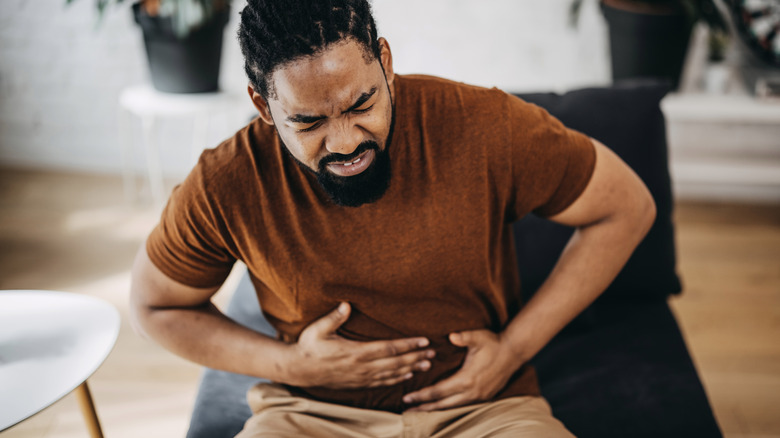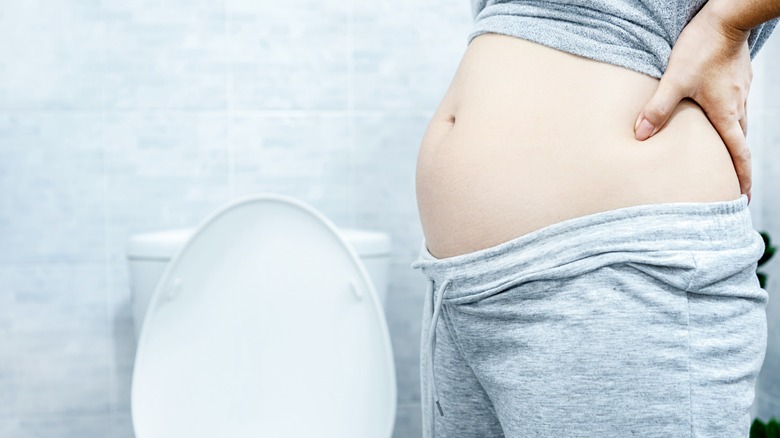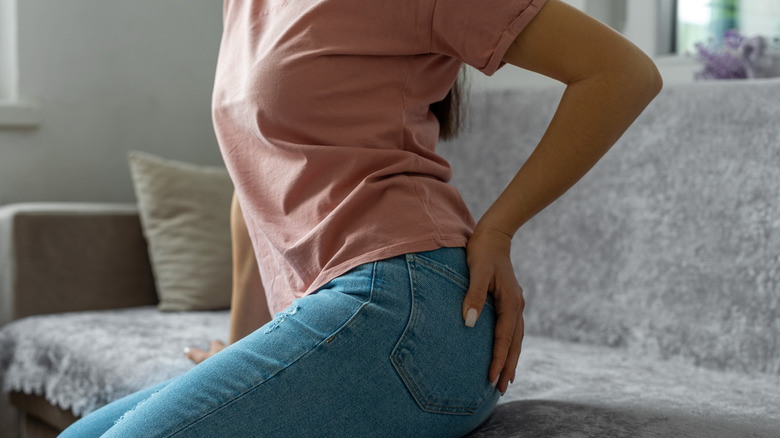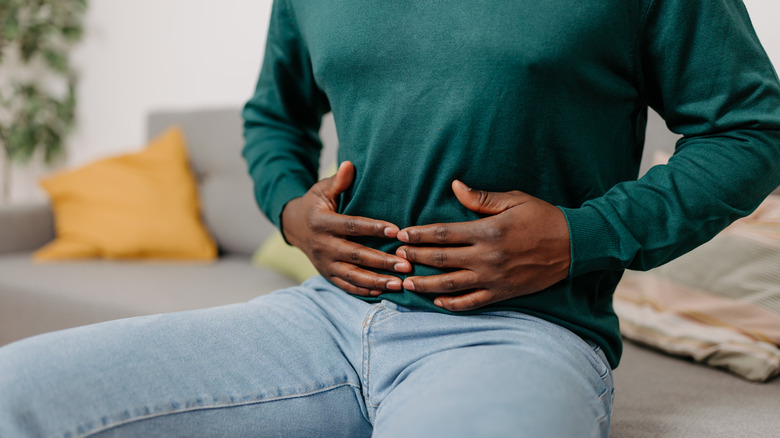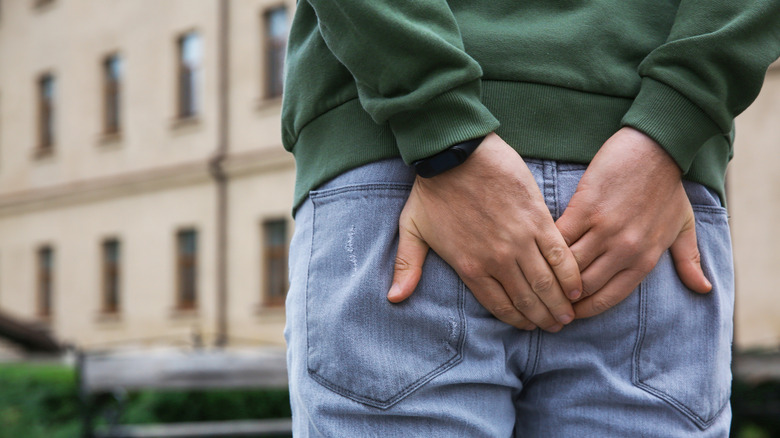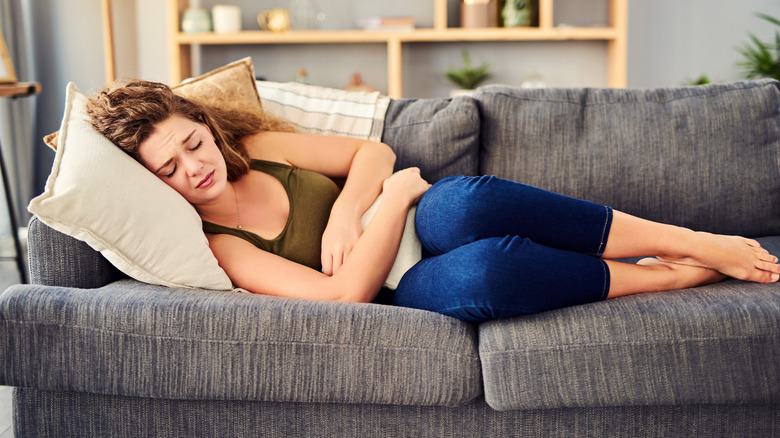What It Means If You Experience Pain While Pooping
Going to the bathroom is one of those things people typically don't talk about. However, paying attention to subtle cues like the color, smell, and consistency of your bowel movements can tell you about your health. You'll also want to pay attention to any pain you feel when going number two.
Pain isn't something you need to live with and can come from several different areas. As the waste moves through your bowels, slow movement can lead to constipation and straining, which can cause hemorrhoids and anal fissures. The intestines themselves could be experiencing an inflammatory bowel disease, which causes burning and bloating when you need to go. You could also be feeling the pain of proctitis in your rectum. Those with a uterus can have pooping pain when endometrial tissue grows in areas it shouldn't in the condition of endometriosis.
Since it can be hard to narrow down what's causing your pain, it's important to learn the signs and symptoms of each different condition and where the pain might be felt. We'll also discuss the various treatment options available through your healthcare provider.
Constipation
When it hurts to poop, look no further than your bowel movements themselves. "Constipation" is the term used for passing fewer than three stools a week. Since the stool stays in your system too long, you must strain and push to remove it. The stools are dry and lumpy and come with gas and bloating, which works to contribute to the pain of it. Sometimes, a finger is even needed to help move the stool along, according to Mayo Clinic. About 4 million people in the U.S. experience regular constipation, and it results in over 2 million visits to a healthcare professional annually (per Johns Hopkins Medicine).
The cause behind your lack of bowel movements can come from various sources. For example, a new medication might make your intestines sluggish, meaning the waste doesn't move as fast as it should through your digestive tract. It could also be a lack of fiber in your diet or a need for more exercise. Your water habits also play into your bout of constipation. Medical conditions of the intestines can also lead to slower-than-average movement.
The treatment for your painful bowel movements due to constipation depends on the cause. For example, it might require you to switch up your medications or add more fiber to your diet. You might also need to get treatment for the underlying condition.
Anal fissures or hemorrhoids
Anal fissures and hemorrhoids are common ailments that affect your rectum. An anal fissure is a break in the skin of the rectum, explains Healthline. This opening in the skin can bleed and cause pain every time you take a poop. On the other hand, a hemorrhoid is an enlargement and protrusion of the veins lining the rectum and anus. When hemorrhoids swell, they lead to severe pain with bowel movements and blood (per Harvard Health). Both conditions also cause itching, especially after a bowel movement.
Anal fissures and hemorrhoids have several similar causes. For example, straining during bowel movements, as you might with constipation, can lead to tears and hemorrhoids. These conditions are also common during pregnancy and for those with inflammatory bowel diseases. Diagnosis of anal fissures or hemorrhoids requires a visit with your doctor to assess how severe the problem might be.
Treatment varies based on the diagnosis. Anal fissures can benefit from a high-fiber diet, drinking lots of fluids, ointments for inflammation, and sitz baths to cool and clean the area. Hemorrhoids like it when you drink and eat high fiber, but it can also be beneficial to avoid prolonged periods of sitting and avoid straining when passing stool. Stool softeners and creams to contain the itch are also recommended. Severe hemorrhoid treatment can require surgery.
Inflammatory bowel disease
Your intestines can succumb to several diseases that leave them inflamed and malfunctioning. The umbrella term for these diseases is "inflammatory bowel disease." This includes both ulcerative colitis and Crohn's disease. According to the Cleveland Clinic, about 3 million people are affected by inflammatory bowel disease, and it's most common among those between the ages of 15 and 30.
These gastrointestinal diseases affect how the bowel functions and moves waste through; therefore, you can experience symptoms like abdominal cramps, diarrhea, bloating, gas, and upset stomach, in addition to painful pooping, according to WebMD. Some individuals can also experience fevers, unexplained weight loss, and lack of appetite. Many times, these chronic diseases flare up and then return to normal. While the cause of inflammatory bowel disease is still heavily discussed, your immune system, genetic factors, and environmental triggers may play a role.
Treating your condition depends on the specific disease and severity, according to the Centers for Disease Control and Prevention. However, medications like corticosteroids and biologics are common. It might also be necessary to undergo surgery in severe cases. For example, diet might be the first defense against a disorder like Crohn's disease by limiting spicy foods and eating smaller amounts. Try fiber supplements before taking medications to quiet the immune system's overreaction.
Proctitis
When number two is leaving you hurting, it could be an inflammation of the line of the rectum called "proctitis." The rectum is at the very end of the colon and opens for waste to pass through. Inflammation in this area causes pain, loose stools, bleeding, and discharge (per Medical News Today). You can also feel the frequent need to head to the toilet.
Proctitis isn't a stand-alone condition and is related to several other infections. According to Mayo Clinic, about 30% of people with proctitis have an inflammatory bowel disease like Crohn's disease. Infectious proctitis can come from sexually transmitted diseases like gonorrhea and chlamydia, says National Institute of Diabetes and Digestive and Kidney Diseases. Food poisoning, medications, radiation, and injury can also lead to inflammation in this area.
The course of treatment you take depends on what might be causing your specific flare-up, states the National Organization for Rare Disorders (NORD). When proctitis flares up from an infection, antibiotics can help clear the inflammation and leave you pain-free. Idiopathic causes like Crohn's disease need a more strategic approach, like medications and dietary changes, to help you deal with the symptoms.
Endometriosis
Issues beyond your intestines and rectum can cause you to feel pooping pain, especially for those with a uterus. Endometriosis happens when the endometrial tissue grows in places beyond the lining of the uterus, like the ovaries, fallopian tubes, vagina, bowel, and rectum. While these growths aren't cancerous, they can swell and bleed just like the lining of your uterus every month, causing inflammation and swelling, per the U.S. Department of Health & Human Services.
Where the endometrial tissue grows regulates the symptoms that you'll feel. For example, rectum endometrial implantation can cause back pain and bleeding, according to the Endometriosis Foundation of America. Constipation and irregular bowel movements are common for those with endometriosis. It can also feel cutting when using the bathroom. Since it can be hard to see endometrial tissue without surgery, endometriosis with gastrointestinal symptoms can get misdiagnosed as inflammatory bowel disease.
Treatment options vary based on the individual but can include medications, hormone therapy, or surgery (per Medline Plus). For those younger, controlling the symptoms with medication might be the best line of defense. Birth control pills and other hormone regulators can stop the cycle of swelling and bleeding, making the pain less. In severe cases, surgery might be used to remove the endometrial tissue.

